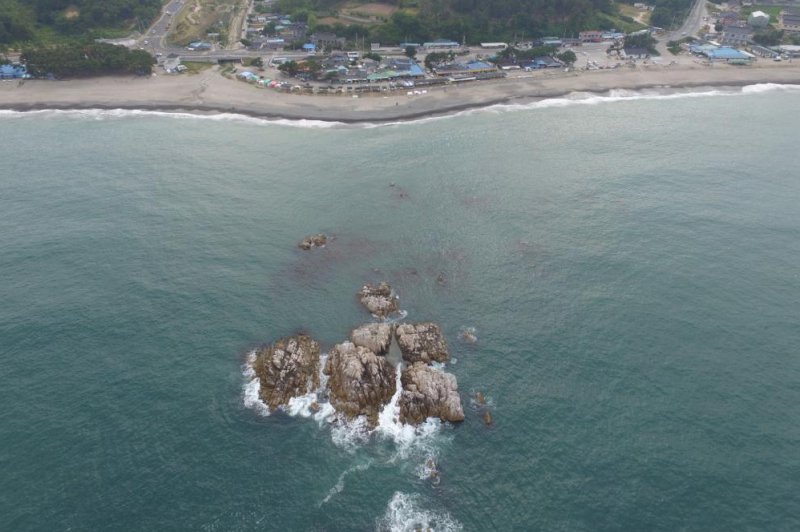ANIMISM, ANCESTOR WORSHIP UNDERLIES ALL KOREAN RELIGIONS
INCLUDING ITS CHRISTIAN CULTS
South Korean authorities dismantled dozens of tents belonging to local shaman practitioners at a site near the underwater tomb of King Munmu (pictured). Photo courtesy of Republic of Korea Cultural Heritage Administration
Aug. 19 (UPI) -- Shamans in South Korea may have been summoning more than spirits near a coastal heritage site in the country.
South Korean authorities dismantled dozens of makeshift tents belonging to local shaman practitioners following complaints. The practitioners of a traditional religion were illegally squatting on land facing a maritime historic site, Yonhap and Daegu Shinmun reported Wednesday.

South Korean authorities dismantled dozens of tents belonging to local shaman practitioners at a site near the underwater tomb of King Munmu (pictured). Photo courtesy of Republic of Korea Cultural Heritage Administration
Aug. 19 (UPI) -- Shamans in South Korea may have been summoning more than spirits near a coastal heritage site in the country.
South Korean authorities dismantled dozens of makeshift tents belonging to local shaman practitioners following complaints. The practitioners of a traditional religion were illegally squatting on land facing a maritime historic site, Yonhap and Daegu Shinmun reported Wednesday.
Authorities in the city of Gyeongju, North Gyeongsang Province said about 30 tents by the sea had been removed. They were met with little resistance, according to reports.
For the past few years the shamans had been performing "gut" rituals by the underwater tomb of an ancient Korean king, who is believed to have unified the Korean Peninsula, while ruling from A.D. 661 to 681. Shamans who believe they must intercede with the spirit and human world to overcome suffering practice the rituals.
Shamans are free to practice their religion, but authorities in Gyeongju said they had entered a restricted forest without permission.
The shamans were also polluting the environment, disposing of their personal garbage in a protected area near the Tomb of King Munmu, located about 200 meters off the coast. The pollution began to draw complaints from local residents, authorities say.
Residents also complained about "loud noises." Korean shamans believe gods, spirits and ancestors descend into their bodies. Under the "possession" of another spirit, the shaman begins to talk and move in a different manner, eyewitnesses have said.
The demolition of the tents began last week. More than 30 Gyeongju city employees were dispatched to the site to dismantle the tents and collect the garbage collecting in the area. Authorities say they plan to plant trees and build fences to curb squatters, according to reports.
King Munmu ruled Korea when the peninsula was under the domination of Tang China. Munmu forged alliances with neighboring Korean kingdoms to launch a frontal attack on Tang forces, eventually defeating Tang, according to South Korean historians.
For the past few years the shamans had been performing "gut" rituals by the underwater tomb of an ancient Korean king, who is believed to have unified the Korean Peninsula, while ruling from A.D. 661 to 681. Shamans who believe they must intercede with the spirit and human world to overcome suffering practice the rituals.
Shamans are free to practice their religion, but authorities in Gyeongju said they had entered a restricted forest without permission.
The shamans were also polluting the environment, disposing of their personal garbage in a protected area near the Tomb of King Munmu, located about 200 meters off the coast. The pollution began to draw complaints from local residents, authorities say.
Residents also complained about "loud noises." Korean shamans believe gods, spirits and ancestors descend into their bodies. Under the "possession" of another spirit, the shaman begins to talk and move in a different manner, eyewitnesses have said.
The demolition of the tents began last week. More than 30 Gyeongju city employees were dispatched to the site to dismantle the tents and collect the garbage collecting in the area. Authorities say they plan to plant trees and build fences to curb squatters, according to reports.
King Munmu ruled Korea when the peninsula was under the domination of Tang China. Munmu forged alliances with neighboring Korean kingdoms to launch a frontal attack on Tang forces, eventually defeating Tang, according to South Korean historians.
No comments:
Post a Comment